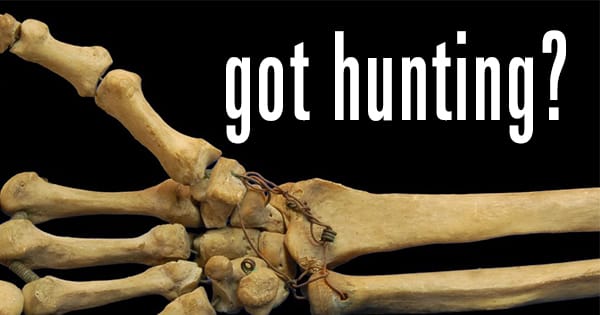Study: Ancient Humans Developed Weaker Bones as They Hunted Less
OutdoorHub Reporters 01.05.15

For much of human history, our ancestors lived in nomadic, hunter-gatherer societies. It was only a few thousand years ago that humans began moving toward agriculture as a way of life, which drastically changed not only food production, but human civilization as a whole. Scientists now say that the invention of farming may have had a physical effect on early humans as well. A recent study conducted in the journal Proceedings of the National Academy of Sciences (PNAS) found that human hunter-gatherers from around 7,000 years ago had much stronger bones compared to their farming descendants 1,000 years later. According to the study, the bone mass of hunter-gatherer humans was about 20 percent higher than that of the farmers. This loss in bone density is attributed to the increasingly sedentary lifestyle provided by efficient agricultural practices, as opposed to strenuous activity of hunting and foraging.
“Sitting in a car or in front of a desk is not what we have evolved to do,” said study co-author Colin Shaw of Cambridge University in a press release.
An earlier study by researchers at the Smithsonian National Museum of Natural History found that the change in bone density first occurred about 12,000 years ago, when humans started to explore farming. The bone strength of the hunter-gatherer humans was similar to that of a modern orangutan, whereas farmers from the same area many years later would have lighter and weaker bones more susceptible to breaking. Discovery Magazine reported that both studies were interested in changes to trabecular bone, the spongy honeycomb-like structure inside our bones. Trabecular bone provides bone with added strength and durability, but can also adjust to increased stress. This is why regular exercise can increase the strength of your bones.
“It can change structure from being pin or rod-like to much thicker, almost plate-like. In the hunter-gatherer bones, everything was thickened,” said Shaw. “The fact is, we’re human, we can be as strong as an orangutan—we’re just not, because we are not challenging our bones with enough loading, predisposing us to have weaker bones so that, as we age, situations arise where bones are breaking when, previously, they would not have.”
There are other theories regarding why humans have developed a weaker, more fragile skeleton. Some scientists say that the change in diet may have caused the decrease in bone mass, or that humans simply adapted to their new role with a lighter, more agile frame. One thing that did surprise researchers is how rapid the change was, and how recently it took place.
“This was absolutely surprising to us,” Habiba Chirchir, a co-author on the second study also published in PNAS, told NPR. “The change is occurring much later in our history.”

